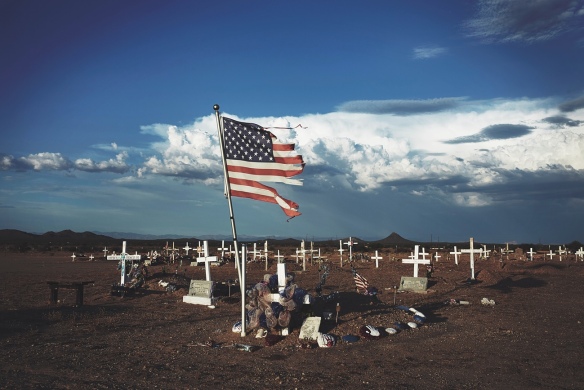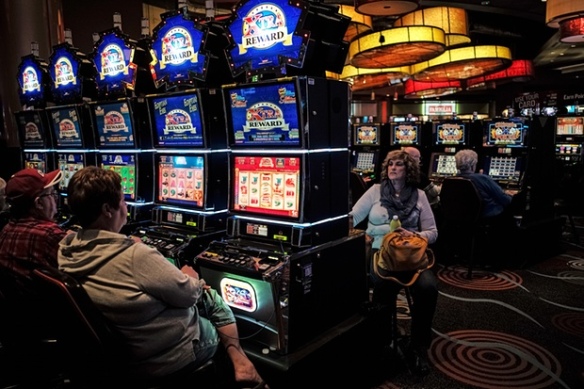
A shredded American flag at a grave site in Blackwater, Arizona. Photograph: Steve Craft for the Guardian
According to the US census bureau’s American community survey 2008-2012 of communities of more than 1,000 people – the latest statistics available at the time of reporting – the median household income in Blackwater was just $9,491 a year. Nationally it was $53,915 in 2012. It has improved more recently to $12,723, but is still less than a quarter of the national average. It is the final stop in a series of Guardian dispatches about the lives of people trying to make a life in places that seem the most remote from the American Dream.
“I was picking cotton in the fields at five years old,” said Lidya, who would only give her first name. She was one of the women working at a centre in Blackwater that provides free lunches for elderly people. “You had this long sack and you had to fill it with cotton. This wasn’t 1868, it was 1968. The casinos changed a lot of things. We’re dependent on them now but there is still that poverty out there. The majority of people here struggle to get by.”
Blackwater sits at the southern end of the 580 square miles designated by the US Congress in 1859 as a home for two tribes – the Akimel O’odham tribe (also known as the Pima) and the Pee Posh (also known as the Maricopa).
The area around the town of little more than 1,000 people – 94% Native American – is mostly farmland and desert. The dried-up bed of the Gila river, which was once the tribes’ lifeblood, is at the town’s eastern flank with the San Tan mountains as backdrop.
Facilities in Blackwater are few beyond tribal offices. No cafes, bars or restaurants. The new houses paid for by the casino revenues, clustered together in their own neighbourhoods, stand out from the crumpled homes that have endured decades of desert winds.

The Wild Horse Pass casino, which brings in millions for the reservation every year. Photograph: Sean Smith for the Guardian
The reservation’s northern tip reaches almost to the city limits. It is the geography of this small corner that has delivered the promise of a different future. The tribal council has taken advantage of a 1987 US supreme court ruling that recognised a degree of sovereignty for Native American reservations as “domestic dependent nations”. Gila River joined the band of Indian communities that got into the casino businesses after the justices said state governments had no authority to stop or regulate them.
The reservation spent $200m building the Wild Horse Pass casino and hotel, the largest in the state when it was completed. The luxury resort now includes a concert venue, golf course and a motorsports race track. The tribal council, as on other reservations, won’t reveal how much it makes from the Wild Horse and two other casinos on Gila River but estimates put it at around $250m a year.
The high-priced cocktails and luxury cars – and the wads of cash lost on the turn of a card – reflect a lifestyle those who live in Blackwater only glimpse if they trouble to venture to the other end of the reservation.

Ira Hayes and other US marines raise the American flag on Mount Suribachi, on the Pacific island of Iwo Jima in 1945. Photograph: Joe Rosenthal/AP
Gila River reservation has had its fleeting moments of fame – and infamy. It was the site of an internment camp for thousands of Japanese Americans during the second world war, over the objections of the tribes.
Towards the war’s end, Ira Hayes’s return from Japan brought a more welcome kind of attention. He is in the far left of the photograph as the American flag is lifted over Iwo Jima during the battle with the Japanese for the island. Within days, three of the six soldiers in the picture were dead.
Years later, his life story was told in a film, The Outsider, where a white man, Tony Curtis, played the Native American hero. It also inspired a Johnny Cash hit, The Ballad of Ira Hayes, with lyrics touching on a bitter legacy that is the source of many of the reservation’s problems to this day:
The water grew Ira’s people’s crops
’Til the white man stole the water rights
And the sparklin’ water stopped.
Hayes was hailed by presidents and feted across the country. But his decline into alcoholism – he was arrested dozens of times for drunken behaviour – and drink-related death at the age of 32 was often portrayed as a consequence of life on the reservation, although the toll of war and fame may have had more to do with it.
Read the complete article on the Guardian newspaper website here.
